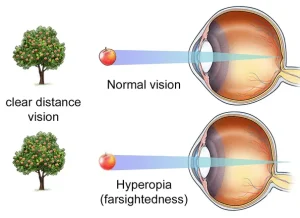Overview
Diagnosis
Farsightedness, also known as hyperopia, is diagnosed through a comprehensive eye exam that includes both a refraction assessment and an evaluation of overall eye health.
A refraction assessment helps determine whether you have vision issues such as nearsightedness, farsightedness, astigmatism, or presbyopia. During this test, your eye doctor will have you look through a series of lenses to measure how well you see objects at different distances.
An eye health exam involves dilating your pupils with eye drops. This allows the doctor to examine the internal structures of your eyes more thoroughly. After dilation, your eyes may be more sensitive to light for a few hours.
Treatment
The main goal of treating farsightedness is to focus light correctly on the retina. This is typically achieved through corrective lenses or, in some cases, refractive surgery.
Prescription lenses
In younger individuals, treatment may not be necessary because the natural lens of the eye can adjust to focus light properly. However, with age, the lens becomes less flexible, and corrective lenses are often needed to improve near vision.
Prescription lenses work by compensating for the eye’s reduced curvature or shorter length. Common options include:
-
Eyeglasses – A simple and effective way to correct farsightedness. Eyeglass options include single-vision lenses, bifocals, trifocals, and progressive multifocals.
-
Contact lenses – These rest directly on the eye and come in various materials and designs, such as soft, rigid gas permeable, spherical, toric, multifocal, and monovision types. Your eye doctor can help determine which design best suits your needs.
Refractive surgery
Refractive surgery reshapes the cornea to correct the way light enters the eye. Although these procedures are more commonly used for nearsightedness, they can also treat mild to moderate farsightedness.
Common surgical options include:
-
Laser-assisted in situ keratomileusis (LASIK) – A small flap is made in the cornea, and a laser reshapes the underlying tissue. Recovery is usually fast with minimal discomfort.
-
Photorefractive keratectomy (PRK) – The outer layer of the cornea (epithelium) is removed, and a laser reshapes the corneal surface. The epithelium naturally grows back to match the new corneal shape.
Discuss with your eye doctor the potential risks and side effects before undergoing refractive surgery.
Lifestyle and home remedies
Farsightedness cannot be prevented, but you can take steps to protect your eyes and maintain good vision:
-
Have regular eye exams, even if you don’t have noticeable vision problems.
-
Manage chronic health conditions such as diabetes and high blood pressure.
-
Wear sunglasses that block ultraviolet (UV) rays.
-
Use protective eyewear during sports, yard work, or when using chemicals.
-
Eat a diet rich in fruits, vegetables, and omega-3 fatty acids found in fish such as tuna and salmon.
-
Avoid smoking, as it increases the risk of eye diseases.
-
Use correct lenses and ensure your prescription is up to date.
-
Maintain good lighting for reading and work.
-
Reduce eyestrain by following the 20-20-20 rule: every 20 minutes, look at something 20 feet away for 20 seconds.
Seek medical attention immediately if you experience sudden vision loss, double vision, flashes of light, or halos around lights. These may signal a serious eye condition.
Preparing for your appointment
Three types of specialists can diagnose and treat farsightedness:
-
Ophthalmologist – A medical doctor who can perform eye exams, prescribe lenses, treat eye diseases, and perform surgeries.
-
Optometrist – A doctor of optometry who provides vision testing, prescribes corrective lenses, and treats common eye conditions.
-
Optician – A trained technician who fits eyeglasses and contact lenses based on prescriptions from ophthalmologists or optometrists.
Before your appointment:
-
Bring your current glasses or contact lenses.
-
Note any vision problems, such as difficulty reading or night driving.
-
List all medications, supplements, and vitamins you take.
-
Write down questions for your doctor.
Questions to ask your eye doctor may include:
-
When should I use corrective lenses?
-
What are the pros and cons of glasses versus contact lenses?
-
How often should I have eye exams?
-
Is refractive surgery a good option for me?
-
Do you recommend any specific resources or websites for more information?
Your doctor may also ask:
-
When did your vision problems begin?
-
Do your symptoms improve when you squint or move objects?
-
Does your family have a history of vision issues?
-
Do you have other health conditions such as diabetes?
-
Have you started any new medications or supplements?
Advertisement

